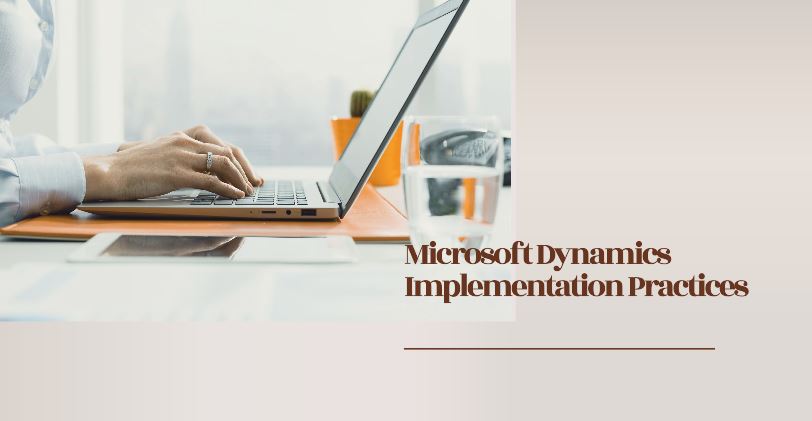In the rapidly evolving business landscape of the United Arab Emirates (UAE), companies are increasingly turning to robust enterprise resource planning (ERP) solutions like Microsoft Dynamics to streamline operations and enhance overall efficiency. Successful implementation of Microsoft Dynamics requires a strategic approach and collaboration with experienced Microsoft implementation partners in the UAE. Furthermore, leveraging Microsoft Azure managed services in the UAE can significantly contribute to a seamless and scalable ERP solution. In this article, we will explore the key best practices for maximizing return on investment (ROI) in Microsoft Dynamics implementation in UAE, focusing on the crucial roles of Microsoft implementation partners and Azure managed services.
Selecting the Right Microsoft Implementation Partner in the UAE :
Choosing the right Microsoft implementation partner is a pivotal decision that can greatly influence the success of an ERP project. In the UAE, businesses should prioritize partners with extensive experience in Microsoft Dynamics implementation, industry-specific expertise, and a proven track record of successful projects. These partners play a crucial role in understanding the unique business requirements of UAE enterprises, ensuring a tailored implementation that aligns with local regulations and market dynamics.
Tailoring Microsoft Dynamics for UAE Business Environment :
Adapting Microsoft Dynamics to the specific needs of the UAE business environment is essential for achieving optimal results. A knowledgeable implementation partner can customize the ERP solution to meet regulatory compliance, localization, and industry-specific requirements. This ensures that Microsoft Dynamics becomes a strategic asset, addressing challenges unique to the UAE market and maximizing the value it brings to the organization.
Utilizing Microsoft Azure Managed Services in the UAE :
Microsoft Azure, as a cloud computing platform, offers a range of services that complement Microsoft Dynamics implementation. Azure managed services in the UAE provide a scalable and secure infrastructure for hosting and managing the ERP solution. This not only enhances performance but also ensures data security and compliance with regional regulations. Leveraging Azure managed services enables businesses to focus on their core operations while the underlying IT infrastructure is efficiently managed by Microsoft experts.
Ensuring Seamless Integration :
Integration with existing systems is a critical aspect of Microsoft Dynamics implementation. A well-thought-out integration strategy ensures that the ERP system seamlessly connects with other business applications and databases. Microsoft implementation partners in the UAE should have expertise in integration methodologies to avoid disruptions and data inconsistencies. This results in a more unified and efficient business process.
Comprehensive Training and Change Management :
While technology is a powerful enabler, the human factor is equally crucial for a successful Microsoft Dynamics implementation. Investing in comprehensive training programs and change management initiatives is essential to ensure that employees at all levels are equipped to leverage the full capabilities of the ERP system. Microsoft implementation partners in the UAE should incorporate training modules that cater to the specific needs of the workforce, fostering a culture of continuous learning and adaptability. By addressing any resistance to change and promoting user adoption, businesses can accelerate the realization of benefits from their Microsoft Dynamics implementation.
Continuous Monitoring and Support :
The implementation of Microsoft Dynamics is not a one-time event but an ongoing process. Continuous monitoring and support from both the internal IT team and the chosen implementation partner are crucial for the long-term success of the ERP solution. Regular system checks, updates, and proactive issue resolution contribute to system stability and performance. Moreover, having a reliable support mechanism ensures that any unforeseen challenges are addressed promptly, preventing disruptions to business operations. Microsoft Azure managed services, in particular, provide real-time monitoring and automated scaling capabilities, optimizing the overall performance of the ERP system.
Scalability and Future-Proofing :
A successful Microsoft Dynamics implementation should not only meet current business needs but also be scalable to accommodate future growth and evolving requirements. Microsoft Azure’s cloud infrastructure offers unparalleled scalability, allowing businesses to adapt to changing market dynamics seamlessly. Microsoft implementation partners in the UAE should design the ERP solution with scalability in mind, ensuring that it can grow in tandem with the organization. This future-proofing approach minimizes the need for major overhauls or re-implementations, saving both time and resources in the long run and providing a sustainable solution that can evolve with the business landscape.
Conclusion:
A successful Microsoft Dynamics implementation in the UAE requires a strategic approach that encompasses the expertise of Microsoft implementation partners and the advantages of Microsoft Azure managed services in UAE . Choosing the right partner, customizing the solution to local requirements, leveraging cloud services, and ensuring seamless integration are all integral components of a successful ERP project. By adhering to these best practices, businesses in the UAE can maximize their ROI and position themselves for sustained growth and competitiveness in the dynamic business landscape of the region.




